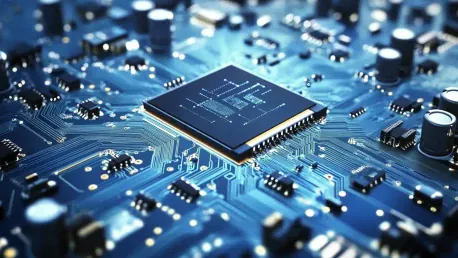In a bold move that underscores the rapid evolution of artificial intelligence, Cerebras Systems has introduced the world’s largest chip, sparking a transformative shift in AI hardware advancements. This breakthrough has profound implications for how AI systems are trained and deployed, especially with the ever-increasing complexity and demand for large language models. Andrew Feldman, co-founder and CEO of Cerebras Systems, detailed how their unique approach to AI hardware resolves many of the traditional challenges associated with chip configurations. Rather than utilizing multiple small chips which necessitate intricate interconnectivity and power management solutions, Cerebras Systems has opted for a more streamlined design. Consolidating more data onto a single, massive chip has not only optimized power consumption but also significantly expedited computations and simplified programming processes. This innovation addresses the inherent inefficiencies of manually cutting and reconnecting chips and presents a more holistic and manageable solution for AI operations.
Integrating Massive Chips for Enhanced AI Training
Traditional methods in AI hardware typically rely on complex configurations involving numerous smaller chips, a setup that poses significant challenges in both interconnectivity and power management. This technical hurdle has often resulted in inefficiencies and higher costs, making AI training an arduous and resource-intensive process. By contrast, Cerebras Systems’ revolutionary design leverages a single, enormous chip, a strategy that mitigates these issues by reducing the need for complex interconnections and extensive power management. This approach not only streamlines the process but also offers substantial energy efficiency gains, making AI training faster and more accessible. Feldman emphasized the importance of this shift, noting that the traditional approach of connecting multiple smaller chips often leads to high levels of inefficiency. With Cerebras Systems’ design, much of this interconnectivity hassle is eliminated, leading to a more cohesive and integrated system.
Such advancements are crucial in the context of training large language models, which require vast computational power and efficient data processing capabilities. The world’s largest chip crafted by Cerebras Systems addresses these needs, offering a significant leap forward in AI training performance. By integrating data onto a singular, massive chip, Cerebras has effectively bypassed the limitations that have long plagued AI hardware. This breakthrough not only showcases the potential for more streamlined AI training but also paves the way for future innovations in the realm of artificial intelligence.
Shifting the Focus to High-Speed Inference
While AI training has historically been the main focus, there is an increasing demand for high-speed inference — the application of trained models to real-world tasks. Cerebras Systems has set new industry benchmarks with its cutting-edge AI hardware, enabling faster and more accurate inference capabilities. Feldman highlights that, with their unique hardware, businesses can achieve both high-speed and high-accuracy results in AI applications, effectively meeting the burgeoning demand for rapid inference. The ability to perform real-time, accurate inferences has become critical in various industries, from healthcare to finance, where timely and precise decision-making is essential. The enhanced speed and efficiency of Cerebras Systems’ chip ensure that AI models can be deployed swiftly and with greater accuracy, thus providing a competitive edge to businesses.
In addition to speed, the innovations in AI hardware have also led to improvements in model accuracy through advanced techniques like agentic models and the chain of thought. These techniques harness the rapid computational power of Cerebras’ chip, allowing AI models to self-improve and deliver increasingly accurate outcomes. The capacity for models to refine themselves in real-time enhances their application in dynamic and complex environments. This dynamic improvement is pivotal in ensuring that AI technologies remain adaptable and continually provide value across various sectors. The advancements made by Cerebras Systems not only amplify the pace at which AI can be applied but also underscore the significance of precision in AI inference.
Meeting the Growing Demand for AI Capabilities
In a significant leap for artificial intelligence, Cerebras Systems has launched the world’s largest chip, marking a pivotal shift in AI hardware advancement. This innovation profoundly affects how AI systems are trained and used, particularly amid the increasing complexity of large language models. Andrew Feldman, co-founder and CEO of Cerebras Systems, explained their novel approach to AI hardware, resolving many issues linked with traditional chip configurations. Instead of relying on numerous small chips requiring complex interconnectivity and power management, Cerebras Systems has chosen a more streamlined design. By integrating more data onto a single, colossal chip, they’ve optimized power consumption, accelerated computations, and simplified programming processes. This breakthrough addresses inefficiencies associated with manually cutting and reconnecting smaller chips, offering a more cohesive and manageable solution for AI operations, ultimately enhancing the efficiency and performance of AI systems.









